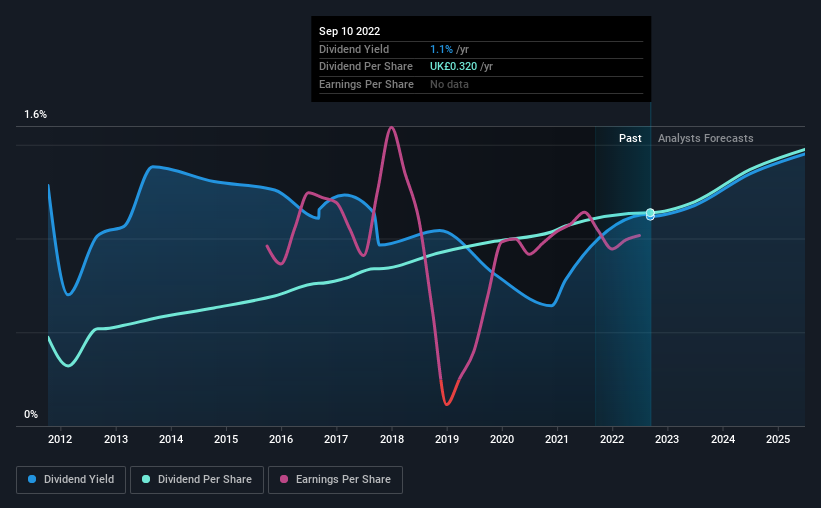
The board of Genus plc (LON:GNS) has announced that it will pay a dividend on the 9th of December, with investors receiving £0.217 per share. This means the annual payment will be 1.1% of the current stock price, which is lower than the industry average.
See our latest analysis for Genus
Genus' Earnings Easily Cover The Distributions
It would be nice for the yield to be higher, but we should also check if higher levels of dividend payment would be sustainable. Based on the last payment, Genus' earnings were much higher than the dividend, but it wasn't converting those earnings into cash flow. In general, we consider cash flow to be more important than earnings, so we would be cautious about relying on the sustainability of this dividend.
Looking forward, earnings per share is forecast to rise by 70.2% over the next year. Assuming the dividend continues along recent trends, we think the payout ratio could be 32% by next year, which is in a pretty sustainable range.

Dividend Volatility
The company has a long dividend track record, but it doesn't look great with cuts in the past. The dividend has gone from an annual total of £0.133 in 2012 to the most recent total annual payment of £0.32. This implies that the company grew its distributions at a yearly rate of about 9.2% over that duration. We like to see dividends have grown at a reasonable rate, but with at least one substantial cut in the payments, we're not certain this dividend stock would be ideal for someone intending to live on the income.
The Dividend's Growth Prospects Are Limited
Growing earnings per share could be a mitigating factor when considering the past fluctuations in the dividend. However, Genus has only grown its earnings per share at 3.1% per annum over the past five years. Growth of 3.1% per annum is not particularly high, which might explain why the company is paying out a higher proportion of earnings. This could mean the dividend doesn't have the growth potential we look for going into the future.
In Summary
Overall, we don't think this company makes a great dividend stock, even though the dividend wasn't cut this year. While Genus is earning enough to cover the payments, the cash flows are lacking. This company is not in the top tier of income providing stocks.
Companies possessing a stable dividend policy will likely enjoy greater investor interest than those suffering from a more inconsistent approach. However, there are other things to consider for investors when analysing stock performance. Earnings growth generally bodes well for the future value of company dividend payments. See if the 4 Genus analysts we track are forecasting continued growth with our free report on analyst estimates for the company. Is Genus not quite the opportunity you were looking for? Why not check out our selection of top dividend stocks.
If you're looking to trade Genus, open an account with the lowest-cost platform trusted by professionals, Interactive Brokers.
With clients in over 200 countries and territories, and access to 160 markets, IBKR lets you trade stocks, options, futures, forex, bonds and funds from a single integrated account.
Enjoy no hidden fees, no account minimums, and FX conversion rates as low as 0.03%, far better than what most brokers offer.
Sponsored ContentNew: Manage All Your Stock Portfolios in One Place
We've created the ultimate portfolio companion for stock investors, and it's free.
• Connect an unlimited number of Portfolios and see your total in one currency
• Be alerted to new Warning Signs or Risks via email or mobile
• Track the Fair Value of your stocks
Have feedback on this article? Concerned about the content? Get in touch with us directly. Alternatively, email editorial-team (at) simplywallst.com.
This article by Simply Wall St is general in nature. We provide commentary based on historical data and analyst forecasts only using an unbiased methodology and our articles are not intended to be financial advice. It does not constitute a recommendation to buy or sell any stock, and does not take account of your objectives, or your financial situation. We aim to bring you long-term focused analysis driven by fundamental data. Note that our analysis may not factor in the latest price-sensitive company announcements or qualitative material. Simply Wall St has no position in any stocks mentioned.
About LSE:GNS
Genus
Operates as an animal genetics company in North America, Latin America, the United Kingdom, rest of Europe, the Middle East, Russia, Africa, and Asia.
Very undervalued with moderate growth potential.
Market Insights
Community Narratives


